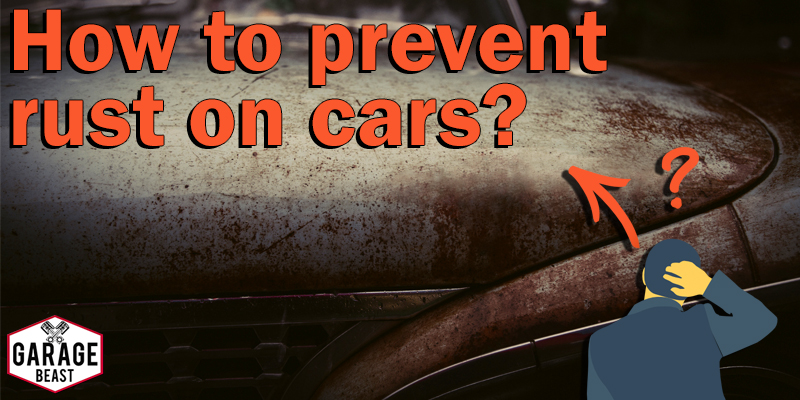Please note that this post may contain affiliate links and any sales made through such links will reward me a small commission – at no extra cost for you..
Rust can give your car a serious concern. Body panels can be ruined by the damage caused by corrosion and also weaken the reliability and rigidity of the structure of the car.
Too much moisture resulting from continued exposure to rain or snow is the most common source of rust. Owing to old age or not being covered correctly, cars can even get rusty.
Your vehicle will be exposed to multiple toxic contaminants in the air as well as bad weather conditions if you do not own a garage.
Suspension parts of cast iron and steel, fuel and brake fluid lines, exhaust systems, fuel tanks and straps may all be damaged by corrosion and can carry large maintenance bills.
Prevent these problems by taking care of the outside of your vehicle correctly and taking steps as signs of rust begin to surface. Preventing it from happening in the first place is the only way for neutralizing rust on cars.
If you’re willing to live with it, rust is easy to stop. Cars, particularly in the winter, can accumulate rust all year.
Table of Contents
Here are a few ways you can prevent rust on cars:
•Wash your Car regularly:
This is the very first and the most important way to rust proof a car. While dirt does not cause rust directly, dirt and sand may wear through your paint over time, especially when the paint is touched by someone.
Bird droppings and oil that spills while charging the car are other factors that can decrease the safety of your vehicle against corrosion. These items fade into wax, transparent coat, and paint over time, leaving the metal vulnerable to rusting.
Too much dirt will make rust accumulate faster in your vehicle. No matter what season it is, you can wash it at least once every other week to prevent rust on car. By side, you can do this or take your vehicle to a car wash.
Clean the car every few weeks so that it is difficult to scrape sand and gravel into the paint. Gasoline and bird droppings will chew through the color. When one comes into touch with the paint, try cleaning the car.
•Park your Car carefully
Parking your car on turf, gravel, snow or badly drained surfaces is only waiting for rust in your vehicle to come and take up permanent residence. When our cars spend much of their idle time at your place of residence.
It can go a long way to hold rust at bay by tackling the home-parking front. If you think it’s too expensive to invest in a driveway enhancement, ask your usual maintenance garage for any cost figures on repairing brake rotors, exhaust systems, suspension control arms, fuel tank and the like, and you’ll find the financial rationale easily.
When your parking lane is paved, don’t rest quick. Old, broken asphalt surfaces will supply the undercarriage of your chariot with almost as much moisture as a dirt field in spring.
Even adding an asphalt sealer coating will help out. Therefore, careful parking is very important to prevent rust on cars and neutralizing the rust.
•Protect the undercarriage of your Car
This is one of the significant ways to stop rust on car undercarriage. Salt and chemical particles on the underside of your car will weaken the ability to protect against rust if you reside in an environment that snows in the winter.
Clean the underside of your car periodically to keep your vehicle from resting on these products for long periods. Many automated car washes provide cleaning of the undercarriage.
You can even jack the car up and use a hose to spray the underside to rust proof your car.
•Apply Ceramic Coating
The easiest way to prevent rust on cars is to wax your vehicle, but now most auto shops prefer ceramic coating as a more efficient, cost-effective solution.
You should add this liquid polymer to the vehicle’s paint. Ceramic coating binds to the paint which, even in extreme circumstances, will not break down.
Cars must be waxed every few months, so you won’t need to do it again for up to three years with a ceramic coating. It could last for much longer in milder climates.
•Neutralize Road Salt
Another way to stop rust on cars is to neutralize road salt as salt is one of rust’s main contributors and it should be avoided to rust proof a car. The metal in your car will corrode quicker when mixed with water.
This is why, in winter, rusting is more likely, when the roads are coated in rock salt. During the winter months, you might want to wash your car once a week. If you live close to a beach, this doesn’t mean your car is exempt from rust.
Salt will also make its way from the sand to the roads. If you have to deal with road salt sometimes, you can want to apply a small amount of baking soda to the soap and water with which you wash your vehicle’s undercarriage and wheel wells.
The acidic effect of the salt and other ice melting products used on the highways would be neutralized with a tablespoon of baking soda. In combination with car cleaner, make sure to use baking soda.
To prevent rust on cars, one tablespoon of baking soda is necessary.
•Apply Anti- Rust Spray
If you see your car attracting a little rust, the only thing to do is to treat it quickly before it spreads for neutralizing rust on cars. You would not have to drive the vehicle to the shop or fix the rusted part if caught in time.
A symptom of rust is typically any place where the paint is bubbling. Clean the area first and make it air dry. You should add anti-rust spray until the region is free of all humidity.
When you can’t afford daily waxing or ceramic painting, this is a nice option. The spray can cover your vehicle for up to one year after it is applied. At most auto parts shops, you can buy aerosol cans with rust inhibitors, or you can make the pros taking care of them for you.
Avoid having some water on brake rotors, drums, linings, or calipers if you do it yourself. Keep it away from hot surfaces, such as catalytic converters and exhaust components, and from cables and electrical wiring. This is also a significant method to prevent rust on cars.
In a Nutshell,
While cars are much better protected than before, over time, they are not totally resistant to corrosion.
Small chips on the ground from stones and debris will expose the car’s metal to rust, worse if left exposed to the elements, particularly near the beach or if you have to drive through water like stream crossings on a regular basis.
Nothing damages a beautiful auto like unsightly rust stains, but you can keep your car in pristine shape for the long run with the right rust prevention strategies.
The key to learning how to prevent rust on cars lies in your routine maintenance habits. In the first place, stopping rust from happening is much more useful than seeking to hide corroded spots.
In this article, we have mentioned various ways for neutralizing rust on cars that might be useful for all car owners and users.

